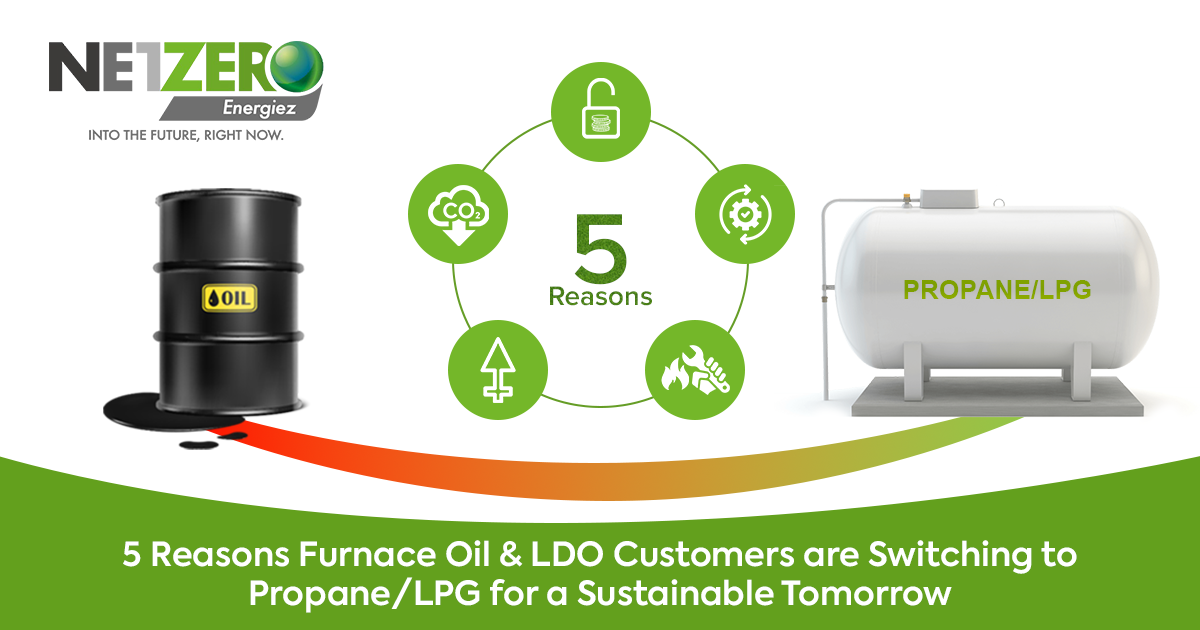
Frequently Asked Questions (FAQs)
- What is LPG?
LPG (Liquefied Petroleum Gas) is a clean, high-octane, abundant and eco-friendly fuel. LPG is obtained from both natural gas processing through fractionation and crude oil refining. It is a mixture of petroleum gases primarily propane and butane. LPG is a gas at atmospheric pressure and normal temperatures, but it can be liquefied when the pressure is increased, or temperature is sufficiently reduced. This makes LPG an ideal energy source for a wide range of applications, as it can be easily condensed, packaged, stored and utilised.
As a cost-effective energy source, LPG is more efficient than traditional fuels, resulting in less energy wastage and better use of our planet’s resources. LPG is extremely versatile and portable. It can be transported using sea, rail, or road. LPG is available in a wide variety of packaging and storage options and is available in even the remotest of areas.
- What is Propane?
Propane is a gas fuel that is also compressed, stored as a liquid, and used as a vapor. It is nontoxic, colourless, and naturally odourless, although an odorant is added to aid in detection. The fuel is used for residential, commercial, industrial, AutoGas, and agricultural use.
- What is bulk LPG /Propane conversion?
Bulk LPG (Liquefied Petroleum Gas) /Propane conversion refers to the process of converting appliances or systems that traditionally use other fuel sources, namely, Furnace oil, Producer gas, Diesel, and natural gas, to utilize LPG/ Propane supplied in bulk quantities, typically stored in large tanks.
- What is FO/LDO and why convert to LPG/Propane?
FO (Furnace Oil) and LDO (Light Diesel Oil) are conventional fossil fuels used for various industrial and commercial applications, such as power generation, heating, steam generation, direct firing, and others. There are several reasons to convert to bulk LPG/Propane. With its net calorific value ranging from 10,850 to 11,500 kcal/kg, this versatile energy source not only ensures significant cost savings but also boosts energy efficiency while leaving a positive imprint on the environment. Offering a compelling alternative to traditional fuel options, bulk LPG/Propane frequently proves more economical and burns cleanly, thereby minimizing environmental footprint.
- What appliances can be converted to bulk LPG/Propane?
A host of appliances can be converted to run on LPG/Propane, including stoves, ovens, water heaters, boilers, furnaces, Thermic fluid heaters, furnace dryers, injection moulding machines and wafer machines. However, it is essential to consult with a qualified technician or contractor to determine if your specific appliance is suitable for conversion.
- What are the steps involved in converting from FO/LDO to LPG/Propane?
The conversion process typically involves assessing the current fuel system, determining the requirements for LPG/Propane storage and handling, installing the necessary equipment such as storage tanks, vaporizers, regulators, and burner systems, modifying or retrofitting existing appliances or machinery to use LPG/Propane, and conducting safety inspections and compliance checks.
- What are the key considerations for successful conversion?
Key considerations include ensuring compatibility of equipment and appliances with LPG/Propane, compliance with safety regulations and standards, proper sizing and installation of storage tanks and distribution systems, availability of LPG/Propane supply, training of personnel on handling and safety procedures, and coordination with relevant authorities and stakeholders.
- Is it safe to convert appliances to bulk LPG/Propane?
When executed by qualified professionals adhering to stringent safety protocols and regulations, conversions to bulk LPG/Propane are very safe. At NetZero Energiez, we prioritize safety more than anything else, guaranteeing that every installation meets all relevant codes and standards, ensuring peace of mind and confidence in your energy transition journey.
- How much does it cost to convert to bulk LPG/Propane?
The cost of converting to bulk LPG /Propane can vary depending on factors such as the number and type of appliances being converted, the existing infrastructure, and any necessary modifications or upgrades. The typical cost of installation is around Rs 80- 100 lakhs. NetZero Energiez bears the capital expenditure once the customer is willing to sign a long- term Supply Agreement, ensuring a seamless transition to sustainable energy without the burden of upfront costs.
- How long does the conversion process take?
The timeline for the conversion process depends on numerous factors, including the complexity of the installation and any supplementary tasks needed to complete the project. Typically, a project could take 6-8 months to complete bulk installation.
- Are there any government Licenses and Fire and safety explosive approval for bulk LPG /Propane conversion?
Yes, it is necessary to obtain a No Objection Certificate (NOC) from the local district collectorate and a PESO license from the Petroleum and Explosives Safety Organization in Nagpur for bulk LPG/Propane conversion.
- Do I need to maintain my converted appliances differently?
Converted appliances may require slightly different maintenance as compared to those using other fuel sources. Regular inspections and servicing by qualified technicians are essential to ensure safety and optimal performance. NetZero Energiez will be responsible for conducting regular maintenance tasks for the installation.
- Can I revert to my previous fuel source after converting to bulk LPG/Propane?
In some cases, it may be possible to revert to the previous fuel source, but it could require additional work and expenses. Multi-fuel Burners being more versatile, provide customers with the flexibility to use different fuels.
- How much land is required for the set up?
In accordance with the Petroleum and Explosives Safety Organization regulations, safety distances will be determined based on the installation's capacity, type and location. Once these factors are finalized, NetZero Energiez’s technical team will furnish precise land requirements and layout drawings and facilitate the entire approval process with the relevant authorities.
